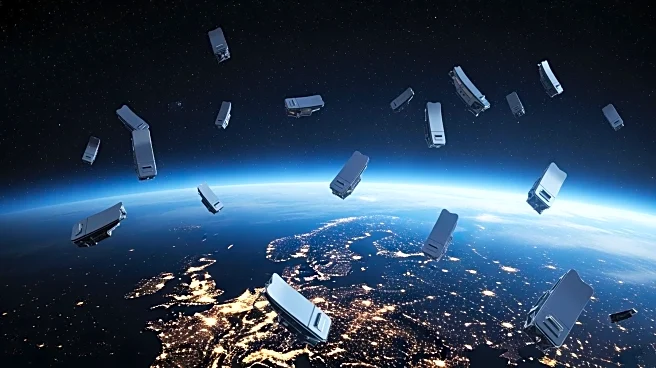What's Happening?
Reflect Orbital, a private company, has proposed a plan to launch 4,000 mirrors into space. These mirrors are intended to reflect sunlight back to Earth, potentially shining four times brighter than the full Moon. The goal is to enhance the efficiency
of solar farms by providing illumination during nighttime hours. However, this initiative has sparked significant concern among astronomers and environmentalists. The primary issue is the potential for increased light pollution, which could severely impact astronomical observations and disturb local wildlife. The light scattering effect, as the beams pass through the upper atmosphere, could reduce visibility over large areas, similar to existing light pollution from urban areas.
Why It's Important?
The proposal by Reflect Orbital highlights a growing tension between technological advancements in renewable energy and the preservation of natural night skies. While the mirrors could boost solar energy production, they pose a threat to astronomical research, which relies on dark skies for clear observations. The project could also disrupt ecosystems by altering natural light patterns, affecting wildlife behavior. This development underscores the need for careful consideration of the environmental and scientific impacts of new space technologies. Stakeholders in the renewable energy sector may benefit from increased efficiency, but the broader scientific community and environmental advocates could face significant challenges.
What's Next?
As Reflect Orbital moves forward with its plan, it is likely to face scrutiny from regulatory bodies and opposition from the scientific community. Discussions around the environmental impact and potential regulations for space-based technologies are expected to intensify. The company may need to engage with astronomers and environmental groups to address concerns and explore potential mitigations. The outcome of these discussions could influence future policies on space technology and its intersection with environmental preservation.
Beyond the Headlines
The Reflect Orbital initiative raises ethical questions about the commercialization of space and its impact on natural resources. The project could set a precedent for future space endeavors, prompting debates on the balance between technological progress and environmental stewardship. Long-term, this could lead to new frameworks for evaluating the ecological and scientific implications of space-based projects.















